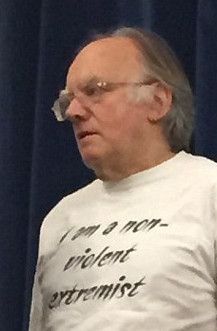"Non-violent extremism"
Revision as of 15:41, 1 August 2017 by Robin (talk | contribs) (Created page with "{{concept |wikipedia= |image= |constitutes=extremism |so_called=1 |wikiquote= }} "'''Non violent extremism'''" is used as means of extending the powerful enemy image of "[...")
(“extremism”) | |
|---|---|
| Interest of | • Counter Extremism Project • Alex Schmid |
"Non violent extremism" is used as means of extending the powerful enemy image of "extremism" to include ideologies whcih are explicitly non-violent. Google trends data would suggest that the phrase was launched in January 2011, 5 years after the phrase "violent extremism" following the 7/7 bombings.
Origins
“non-violent extremism goes unchallenged, the values that bind our society together fragment”.” [1]

Ian Fantom with a shirt declaring that "I am a non-violent extremist". The obverse reads "9/11 and 7/17 were staged."[2]
Association with Violent extremism
The Guardian reported in 2017 on the UK Government's plans to ban "non-violent extremism" by citing an anonymous "source close to the process" that "The bill is sinking without trace. They cannot get a working definition of extremism – lawyers are effectively saying it's incompatible with issues like free speech".[3]
Related Quotations
| Page | Quote | Author | Date |
|---|---|---|---|
| "Extremism" | “the distinction between “non-violent extremism” and “violent extremism” is not a valid one.” | Alex Schmid | May 2014 |
| RAND/Terrorism Chronology Database | “Since the RAND-St Andrews chronology only records those incidents that are ‘international’, the database is orientated towards the recording of attacks on foreign visitors to, and military occupiers of, relatively poor countries. By definition those victims are normally business representatives and military personnel from economically strong, normally Western, nations. The second observation, which reinforces this latter point, is that the Chronology explicitly excludes acts of state terror committed by any government against its own citizens, and acts of violence occurring in war or in war-like situations. Incidents involving Western armies of occupation and businesses are included in the Chronology only where they are victims rather than the perpetrators of violence. Third, some of the methodological inconsistencies in the use of data in the Chronology database are reminiscent of the counter-insurgency position. It is possible to find non-violent activities and protests against state violence recorded in the database as "terrorism."” | Jonny Burnett Dave Whyte |
Many thanks to our Patrons who cover ~2/3 of our hosting bill. Please join them if you can.
References
- ↑ , 2015
- ↑ http://www.dailymail.co.uk/news/article-3906394/Jeremy-Corbyn-s-brother-Piers-gives-speech-alongside-notorious-Holocaust-denier-9-11-conspiracy-theorist.html
- ↑ https://www.theguardian.com/politics/2017/jan/29/theresa-may-counter-terrorism-bill-sinking-without-trace-extremism-british-values
